An Analysis of Consumer Behaviour and Decision-Making in Hospitality
VerifiedAdded on 2021/02/21
|14
|3834
|110
Report
AI Summary
This report delves into the intricacies of consumer behavior within the hospitality sector. It examines the consumer decision-making process, from need recognition to post-purchase evaluation, and how marketers can influence each stage. The report analyzes the path of purchase for hospitality services, using examples like conference bookings, and highlights the importance of mapping this path for marketers to increase ROI and personalize customer engagement. Furthermore, it compares B2C and B2B decision-making in hospitality, outlining differences in customer focus and relationship dynamics. The report also explores market research approaches and methods relevant to both B2B and B2C contexts within the industry, discussing how different factors, including marketing mix elements and consumer heuristics, affect buying behavior. Finally, it evaluates how marketers respond to the consumer decision-making process and influence consumer choices, supported by relevant theories and models.
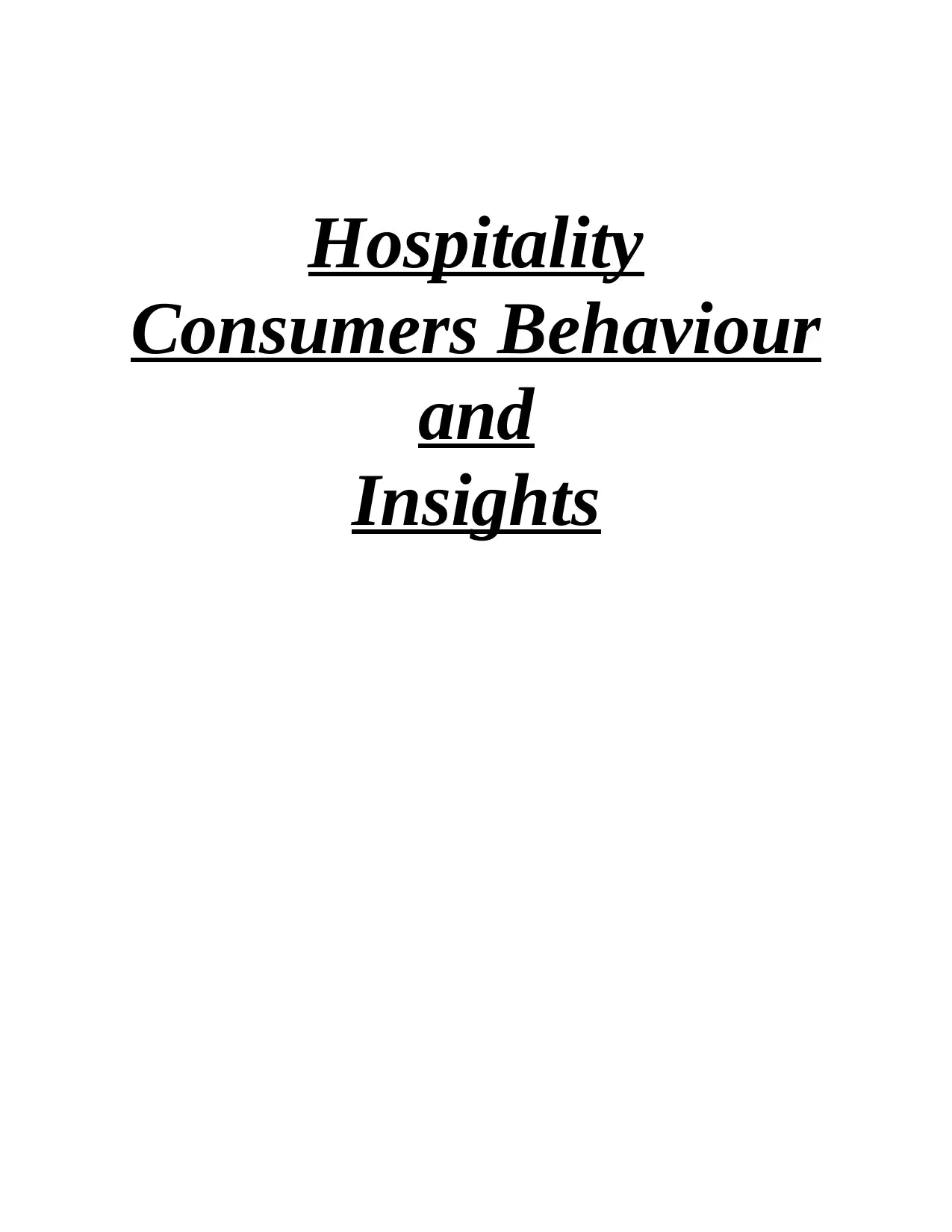
Hospitality
Consumers Behaviour
and
Insights
Consumers Behaviour
and
Insights
Paraphrase This Document
Need a fresh take? Get an instant paraphrase of this document with our AI Paraphraser
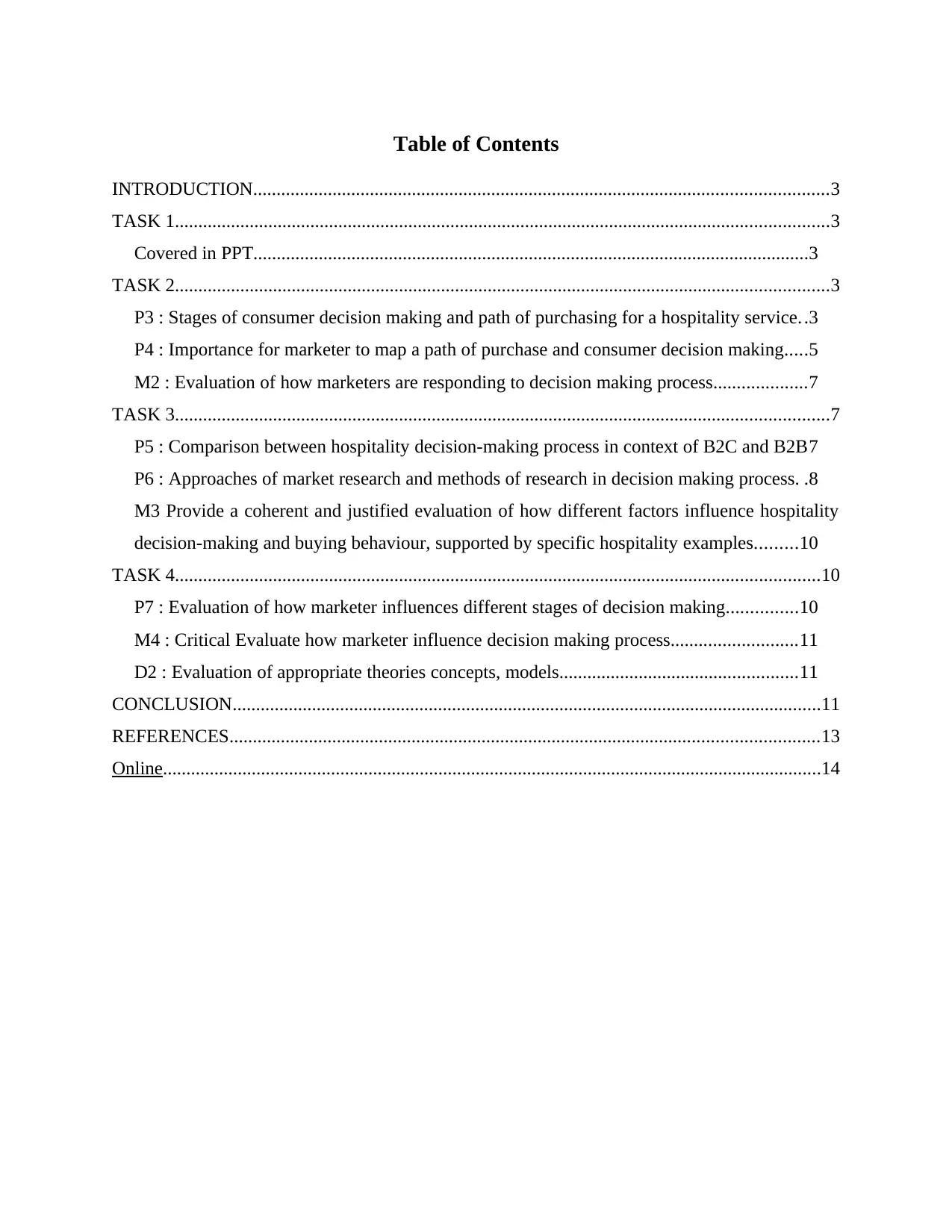
Table of Contents
INTRODUCTION...........................................................................................................................3
TASK 1............................................................................................................................................3
Covered in PPT.......................................................................................................................3
TASK 2............................................................................................................................................3
P3 : Stages of consumer decision making and path of purchasing for a hospitality service..3
P4 : Importance for marketer to map a path of purchase and consumer decision making.....5
M2 : Evaluation of how marketers are responding to decision making process....................7
TASK 3............................................................................................................................................7
P5 : Comparison between hospitality decision-making process in context of B2C and B2B7
P6 : Approaches of market research and methods of research in decision making process. .8
M3 Provide a coherent and justified evaluation of how different factors influence hospitality
decision-making and buying behaviour, supported by specific hospitality examples.........10
TASK 4..........................................................................................................................................10
P7 : Evaluation of how marketer influences different stages of decision making...............10
M4 : Critical Evaluate how marketer influence decision making process...........................11
D2 : Evaluation of appropriate theories concepts, models...................................................11
CONCLUSION..............................................................................................................................11
REFERENCES..............................................................................................................................13
Online.............................................................................................................................................14
INTRODUCTION...........................................................................................................................3
TASK 1............................................................................................................................................3
Covered in PPT.......................................................................................................................3
TASK 2............................................................................................................................................3
P3 : Stages of consumer decision making and path of purchasing for a hospitality service..3
P4 : Importance for marketer to map a path of purchase and consumer decision making.....5
M2 : Evaluation of how marketers are responding to decision making process....................7
TASK 3............................................................................................................................................7
P5 : Comparison between hospitality decision-making process in context of B2C and B2B7
P6 : Approaches of market research and methods of research in decision making process. .8
M3 Provide a coherent and justified evaluation of how different factors influence hospitality
decision-making and buying behaviour, supported by specific hospitality examples.........10
TASK 4..........................................................................................................................................10
P7 : Evaluation of how marketer influences different stages of decision making...............10
M4 : Critical Evaluate how marketer influence decision making process...........................11
D2 : Evaluation of appropriate theories concepts, models...................................................11
CONCLUSION..............................................................................................................................11
REFERENCES..............................................................................................................................13
Online.............................................................................................................................................14
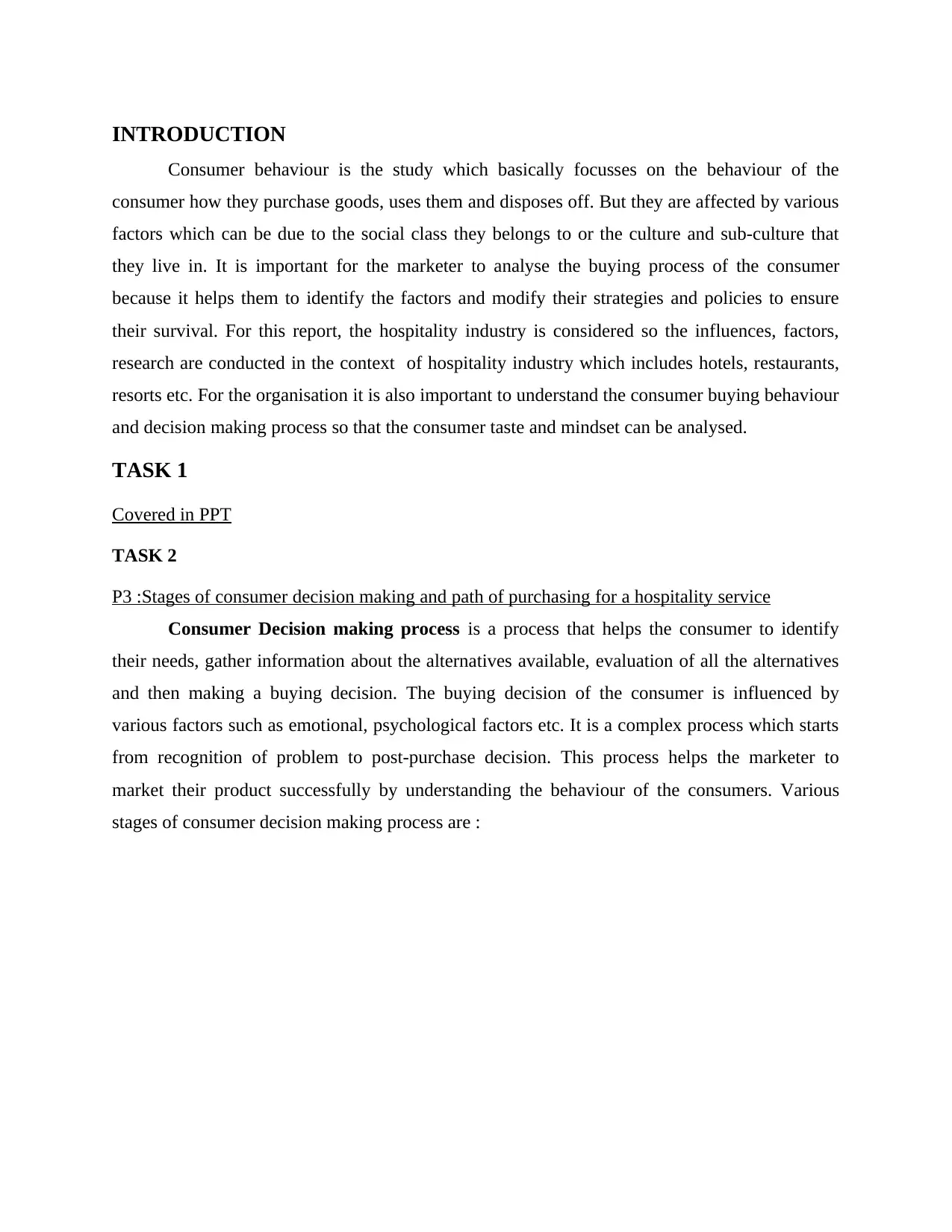
INTRODUCTION
Consumer behaviour is the study which basically focusses on the behaviour of the
consumer how they purchase goods, uses them and disposes off. But they are affected by various
factors which can be due to the social class they belongs to or the culture and sub-culture that
they live in. It is important for the marketer to analyse the buying process of the consumer
because it helps them to identify the factors and modify their strategies and policies to ensure
their survival. For this report, the hospitality industry is considered so the influences, factors,
research are conducted in the context of hospitality industry which includes hotels, restaurants,
resorts etc. For the organisation it is also important to understand the consumer buying behaviour
and decision making process so that the consumer taste and mindset can be analysed.
TASK 1
Covered in PPT
TASK 2
P3 :Stages of consumer decision making and path of purchasing for a hospitality service
Consumer Decision making process is a process that helps the consumer to identify
their needs, gather information about the alternatives available, evaluation of all the alternatives
and then making a buying decision. The buying decision of the consumer is influenced by
various factors such as emotional, psychological factors etc. It is a complex process which starts
from recognition of problem to post-purchase decision. This process helps the marketer to
market their product successfully by understanding the behaviour of the consumers. Various
stages of consumer decision making process are :
Consumer behaviour is the study which basically focusses on the behaviour of the
consumer how they purchase goods, uses them and disposes off. But they are affected by various
factors which can be due to the social class they belongs to or the culture and sub-culture that
they live in. It is important for the marketer to analyse the buying process of the consumer
because it helps them to identify the factors and modify their strategies and policies to ensure
their survival. For this report, the hospitality industry is considered so the influences, factors,
research are conducted in the context of hospitality industry which includes hotels, restaurants,
resorts etc. For the organisation it is also important to understand the consumer buying behaviour
and decision making process so that the consumer taste and mindset can be analysed.
TASK 1
Covered in PPT
TASK 2
P3 :Stages of consumer decision making and path of purchasing for a hospitality service
Consumer Decision making process is a process that helps the consumer to identify
their needs, gather information about the alternatives available, evaluation of all the alternatives
and then making a buying decision. The buying decision of the consumer is influenced by
various factors such as emotional, psychological factors etc. It is a complex process which starts
from recognition of problem to post-purchase decision. This process helps the marketer to
market their product successfully by understanding the behaviour of the consumers. Various
stages of consumer decision making process are :
⊘ This is a preview!⊘
Do you want full access?
Subscribe today to unlock all pages.

Trusted by 1+ million students worldwide
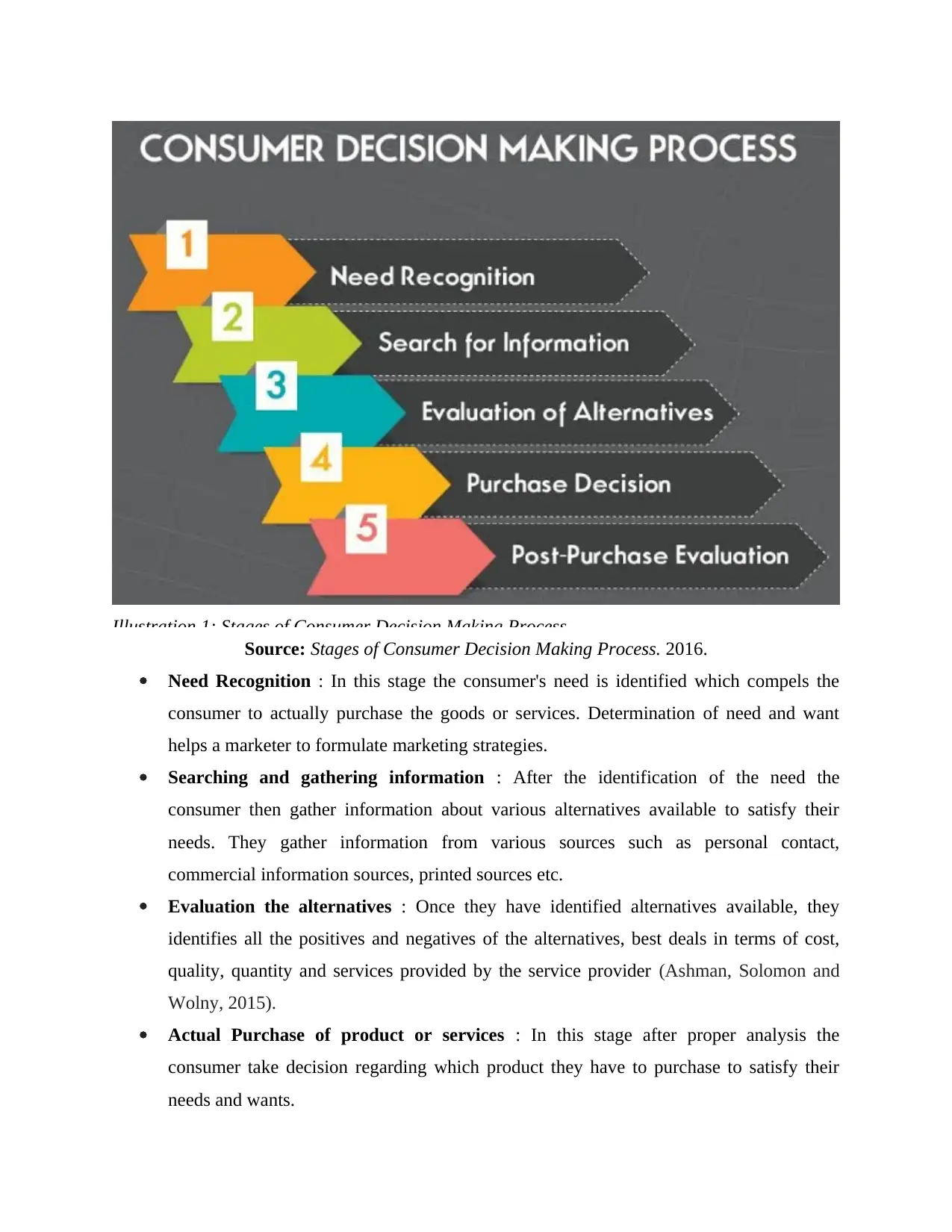
Illustration 1: Stages of Consumer Decision Making Process
Source: Stages of Consumer Decision Making Process. 2016.
Need Recognition : In this stage the consumer's need is identified which compels the
consumer to actually purchase the goods or services. Determination of need and want
helps a marketer to formulate marketing strategies.
Searching and gathering information : After the identification of the need the
consumer then gather information about various alternatives available to satisfy their
needs. They gather information from various sources such as personal contact,
commercial information sources, printed sources etc.
Evaluation the alternatives : Once they have identified alternatives available, they
identifies all the positives and negatives of the alternatives, best deals in terms of cost,
quality, quantity and services provided by the service provider (Ashman, Solomon and
Wolny, 2015).
Actual Purchase of product or services : In this stage after proper analysis the
consumer take decision regarding which product they have to purchase to satisfy their
needs and wants.
Source: Stages of Consumer Decision Making Process. 2016.
Need Recognition : In this stage the consumer's need is identified which compels the
consumer to actually purchase the goods or services. Determination of need and want
helps a marketer to formulate marketing strategies.
Searching and gathering information : After the identification of the need the
consumer then gather information about various alternatives available to satisfy their
needs. They gather information from various sources such as personal contact,
commercial information sources, printed sources etc.
Evaluation the alternatives : Once they have identified alternatives available, they
identifies all the positives and negatives of the alternatives, best deals in terms of cost,
quality, quantity and services provided by the service provider (Ashman, Solomon and
Wolny, 2015).
Actual Purchase of product or services : In this stage after proper analysis the
consumer take decision regarding which product they have to purchase to satisfy their
needs and wants.
Paraphrase This Document
Need a fresh take? Get an instant paraphrase of this document with our AI Paraphraser
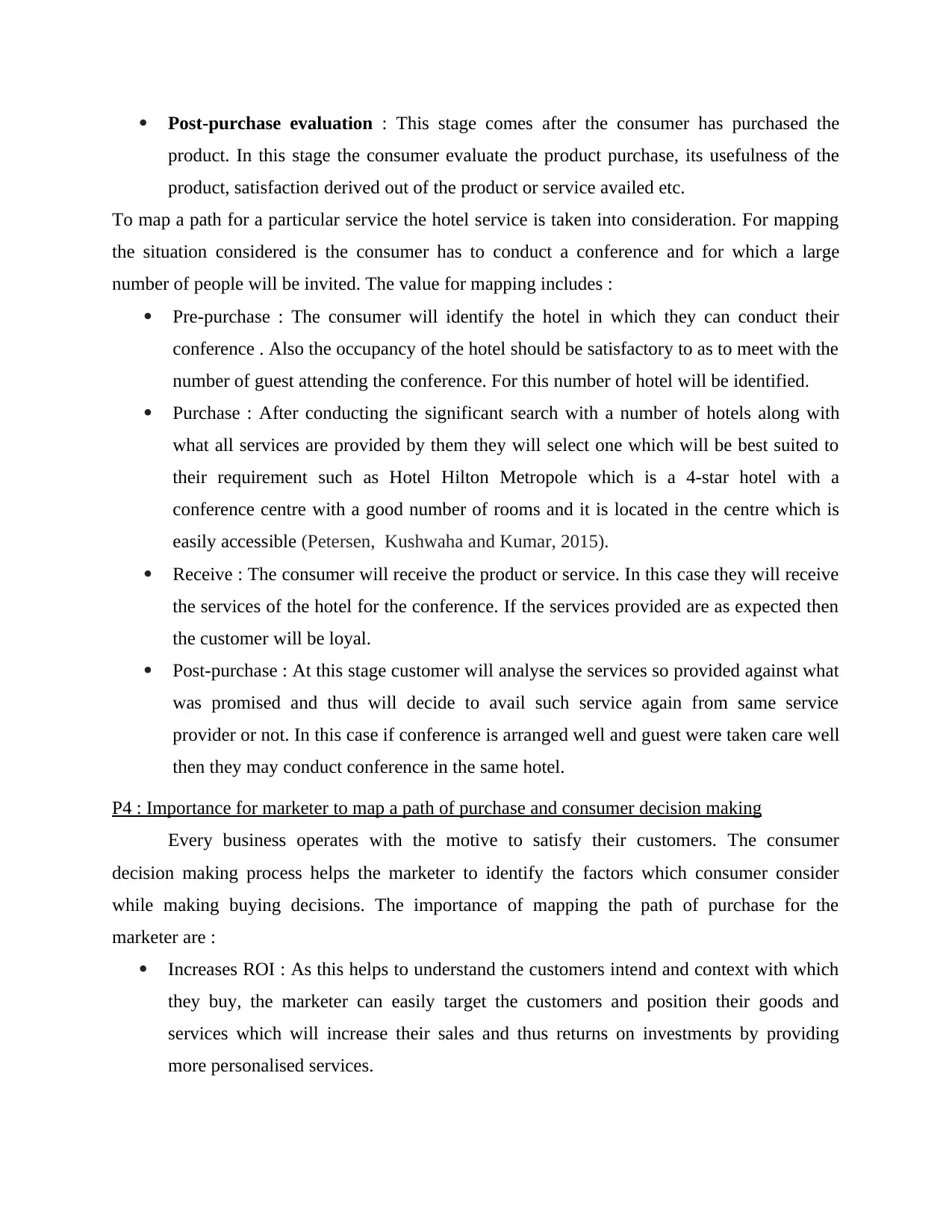
Post-purchase evaluation : This stage comes after the consumer has purchased the
product. In this stage the consumer evaluate the product purchase, its usefulness of the
product, satisfaction derived out of the product or service availed etc.
To map a path for a particular service the hotel service is taken into consideration. For mapping
the situation considered is the consumer has to conduct a conference and for which a large
number of people will be invited. The value for mapping includes :
Pre-purchase : The consumer will identify the hotel in which they can conduct their
conference . Also the occupancy of the hotel should be satisfactory to as to meet with the
number of guest attending the conference. For this number of hotel will be identified.
Purchase : After conducting the significant search with a number of hotels along with
what all services are provided by them they will select one which will be best suited to
their requirement such as Hotel Hilton Metropole which is a 4-star hotel with a
conference centre with a good number of rooms and it is located in the centre which is
easily accessible (Petersen, Kushwaha and Kumar, 2015).
Receive : The consumer will receive the product or service. In this case they will receive
the services of the hotel for the conference. If the services provided are as expected then
the customer will be loyal.
Post-purchase : At this stage customer will analyse the services so provided against what
was promised and thus will decide to avail such service again from same service
provider or not. In this case if conference is arranged well and guest were taken care well
then they may conduct conference in the same hotel.
P4 : Importance for marketer to map a path of purchase and consumer decision making
Every business operates with the motive to satisfy their customers. The consumer
decision making process helps the marketer to identify the factors which consumer consider
while making buying decisions. The importance of mapping the path of purchase for the
marketer are :
Increases ROI : As this helps to understand the customers intend and context with which
they buy, the marketer can easily target the customers and position their goods and
services which will increase their sales and thus returns on investments by providing
more personalised services.
product. In this stage the consumer evaluate the product purchase, its usefulness of the
product, satisfaction derived out of the product or service availed etc.
To map a path for a particular service the hotel service is taken into consideration. For mapping
the situation considered is the consumer has to conduct a conference and for which a large
number of people will be invited. The value for mapping includes :
Pre-purchase : The consumer will identify the hotel in which they can conduct their
conference . Also the occupancy of the hotel should be satisfactory to as to meet with the
number of guest attending the conference. For this number of hotel will be identified.
Purchase : After conducting the significant search with a number of hotels along with
what all services are provided by them they will select one which will be best suited to
their requirement such as Hotel Hilton Metropole which is a 4-star hotel with a
conference centre with a good number of rooms and it is located in the centre which is
easily accessible (Petersen, Kushwaha and Kumar, 2015).
Receive : The consumer will receive the product or service. In this case they will receive
the services of the hotel for the conference. If the services provided are as expected then
the customer will be loyal.
Post-purchase : At this stage customer will analyse the services so provided against what
was promised and thus will decide to avail such service again from same service
provider or not. In this case if conference is arranged well and guest were taken care well
then they may conduct conference in the same hotel.
P4 : Importance for marketer to map a path of purchase and consumer decision making
Every business operates with the motive to satisfy their customers. The consumer
decision making process helps the marketer to identify the factors which consumer consider
while making buying decisions. The importance of mapping the path of purchase for the
marketer are :
Increases ROI : As this helps to understand the customers intend and context with which
they buy, the marketer can easily target the customers and position their goods and
services which will increase their sales and thus returns on investments by providing
more personalised services.
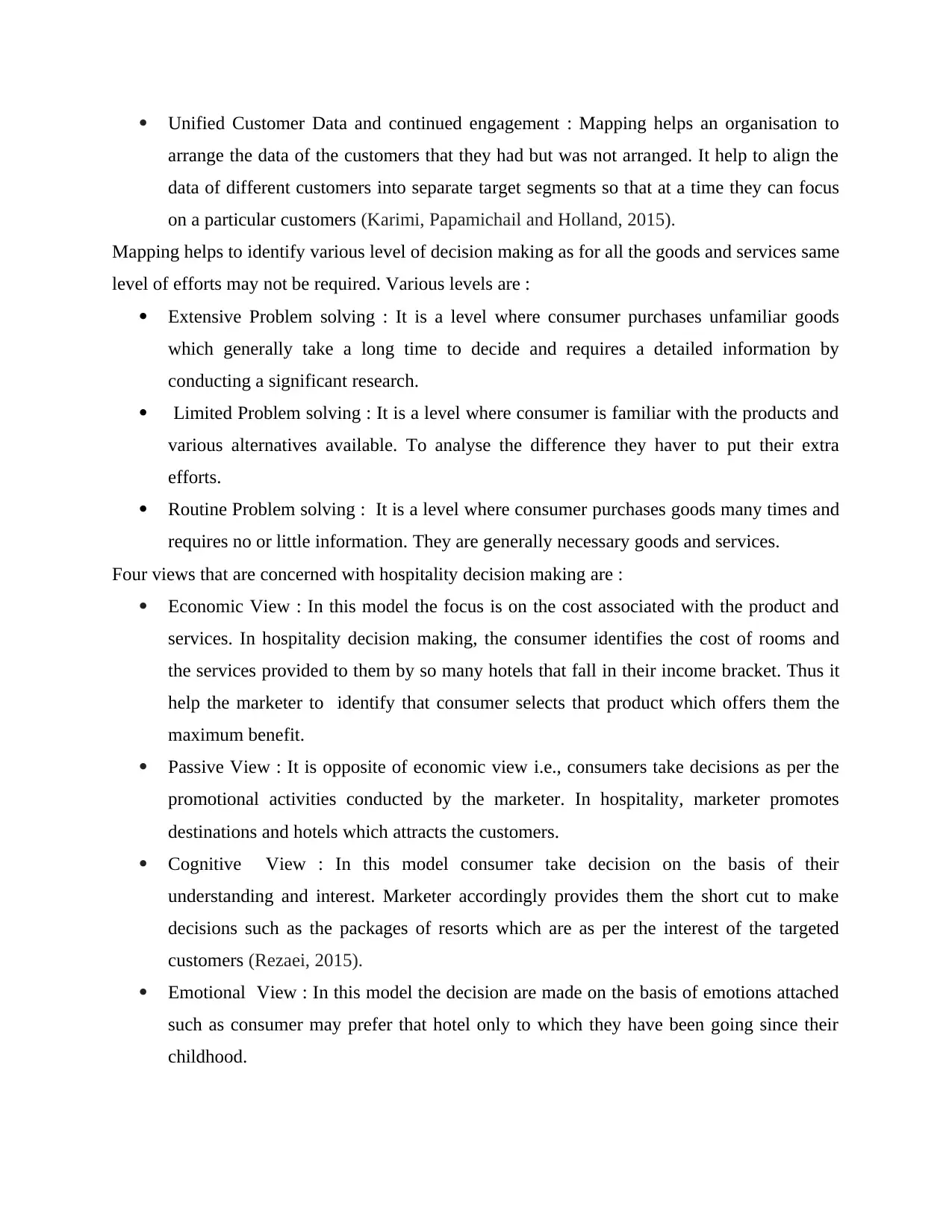
Unified Customer Data and continued engagement : Mapping helps an organisation to
arrange the data of the customers that they had but was not arranged. It help to align the
data of different customers into separate target segments so that at a time they can focus
on a particular customers (Karimi, Papamichail and Holland, 2015).
Mapping helps to identify various level of decision making as for all the goods and services same
level of efforts may not be required. Various levels are :
Extensive Problem solving : It is a level where consumer purchases unfamiliar goods
which generally take a long time to decide and requires a detailed information by
conducting a significant research.
Limited Problem solving : It is a level where consumer is familiar with the products and
various alternatives available. To analyse the difference they haver to put their extra
efforts.
Routine Problem solving : It is a level where consumer purchases goods many times and
requires no or little information. They are generally necessary goods and services.
Four views that are concerned with hospitality decision making are :
Economic View : In this model the focus is on the cost associated with the product and
services. In hospitality decision making, the consumer identifies the cost of rooms and
the services provided to them by so many hotels that fall in their income bracket. Thus it
help the marketer to identify that consumer selects that product which offers them the
maximum benefit.
Passive View : It is opposite of economic view i.e., consumers take decisions as per the
promotional activities conducted by the marketer. In hospitality, marketer promotes
destinations and hotels which attracts the customers.
Cognitive View : In this model consumer take decision on the basis of their
understanding and interest. Marketer accordingly provides them the short cut to make
decisions such as the packages of resorts which are as per the interest of the targeted
customers (Rezaei, 2015).
Emotional View : In this model the decision are made on the basis of emotions attached
such as consumer may prefer that hotel only to which they have been going since their
childhood.
arrange the data of the customers that they had but was not arranged. It help to align the
data of different customers into separate target segments so that at a time they can focus
on a particular customers (Karimi, Papamichail and Holland, 2015).
Mapping helps to identify various level of decision making as for all the goods and services same
level of efforts may not be required. Various levels are :
Extensive Problem solving : It is a level where consumer purchases unfamiliar goods
which generally take a long time to decide and requires a detailed information by
conducting a significant research.
Limited Problem solving : It is a level where consumer is familiar with the products and
various alternatives available. To analyse the difference they haver to put their extra
efforts.
Routine Problem solving : It is a level where consumer purchases goods many times and
requires no or little information. They are generally necessary goods and services.
Four views that are concerned with hospitality decision making are :
Economic View : In this model the focus is on the cost associated with the product and
services. In hospitality decision making, the consumer identifies the cost of rooms and
the services provided to them by so many hotels that fall in their income bracket. Thus it
help the marketer to identify that consumer selects that product which offers them the
maximum benefit.
Passive View : It is opposite of economic view i.e., consumers take decisions as per the
promotional activities conducted by the marketer. In hospitality, marketer promotes
destinations and hotels which attracts the customers.
Cognitive View : In this model consumer take decision on the basis of their
understanding and interest. Marketer accordingly provides them the short cut to make
decisions such as the packages of resorts which are as per the interest of the targeted
customers (Rezaei, 2015).
Emotional View : In this model the decision are made on the basis of emotions attached
such as consumer may prefer that hotel only to which they have been going since their
childhood.
⊘ This is a preview!⊘
Do you want full access?
Subscribe today to unlock all pages.

Trusted by 1+ million students worldwide
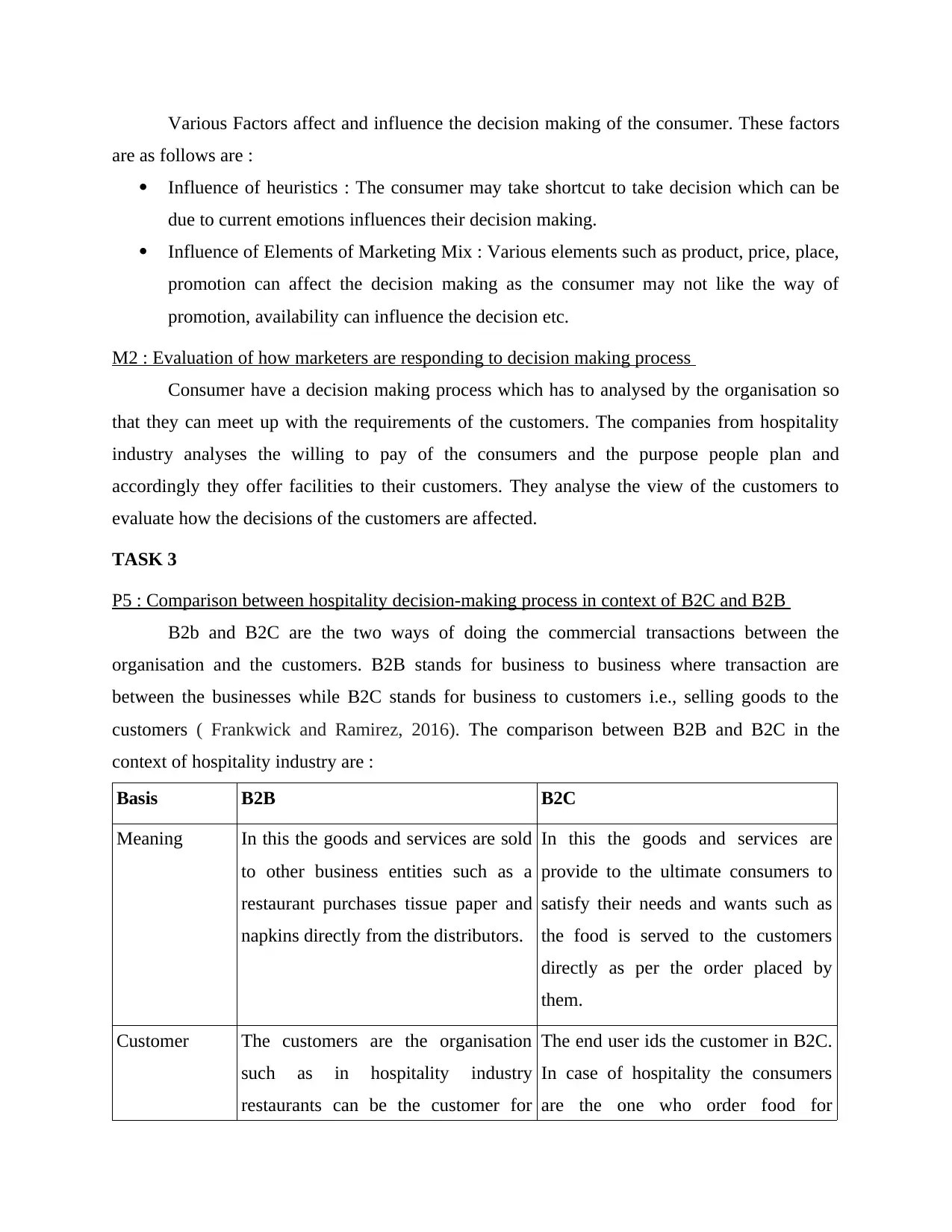
Various Factors affect and influence the decision making of the consumer. These factors
are as follows are :
Influence of heuristics : The consumer may take shortcut to take decision which can be
due to current emotions influences their decision making.
Influence of Elements of Marketing Mix : Various elements such as product, price, place,
promotion can affect the decision making as the consumer may not like the way of
promotion, availability can influence the decision etc.
M2 : Evaluation of how marketers are responding to decision making process
Consumer have a decision making process which has to analysed by the organisation so
that they can meet up with the requirements of the customers. The companies from hospitality
industry analyses the willing to pay of the consumers and the purpose people plan and
accordingly they offer facilities to their customers. They analyse the view of the customers to
evaluate how the decisions of the customers are affected.
TASK 3
P5 : Comparison between hospitality decision-making process in context of B2C and B2B
B2b and B2C are the two ways of doing the commercial transactions between the
organisation and the customers. B2B stands for business to business where transaction are
between the businesses while B2C stands for business to customers i.e., selling goods to the
customers ( Frankwick and Ramirez, 2016). The comparison between B2B and B2C in the
context of hospitality industry are :
Basis B2B B2C
Meaning In this the goods and services are sold
to other business entities such as a
restaurant purchases tissue paper and
napkins directly from the distributors.
In this the goods and services are
provide to the ultimate consumers to
satisfy their needs and wants such as
the food is served to the customers
directly as per the order placed by
them.
Customer The customers are the organisation
such as in hospitality industry
restaurants can be the customer for
The end user ids the customer in B2C.
In case of hospitality the consumers
are the one who order food for
are as follows are :
Influence of heuristics : The consumer may take shortcut to take decision which can be
due to current emotions influences their decision making.
Influence of Elements of Marketing Mix : Various elements such as product, price, place,
promotion can affect the decision making as the consumer may not like the way of
promotion, availability can influence the decision etc.
M2 : Evaluation of how marketers are responding to decision making process
Consumer have a decision making process which has to analysed by the organisation so
that they can meet up with the requirements of the customers. The companies from hospitality
industry analyses the willing to pay of the consumers and the purpose people plan and
accordingly they offer facilities to their customers. They analyse the view of the customers to
evaluate how the decisions of the customers are affected.
TASK 3
P5 : Comparison between hospitality decision-making process in context of B2C and B2B
B2b and B2C are the two ways of doing the commercial transactions between the
organisation and the customers. B2B stands for business to business where transaction are
between the businesses while B2C stands for business to customers i.e., selling goods to the
customers ( Frankwick and Ramirez, 2016). The comparison between B2B and B2C in the
context of hospitality industry are :
Basis B2B B2C
Meaning In this the goods and services are sold
to other business entities such as a
restaurant purchases tissue paper and
napkins directly from the distributors.
In this the goods and services are
provide to the ultimate consumers to
satisfy their needs and wants such as
the food is served to the customers
directly as per the order placed by
them.
Customer The customers are the organisation
such as in hospitality industry
restaurants can be the customer for
The end user ids the customer in B2C.
In case of hospitality the consumers
are the one who order food for
Paraphrase This Document
Need a fresh take? Get an instant paraphrase of this document with our AI Paraphraser
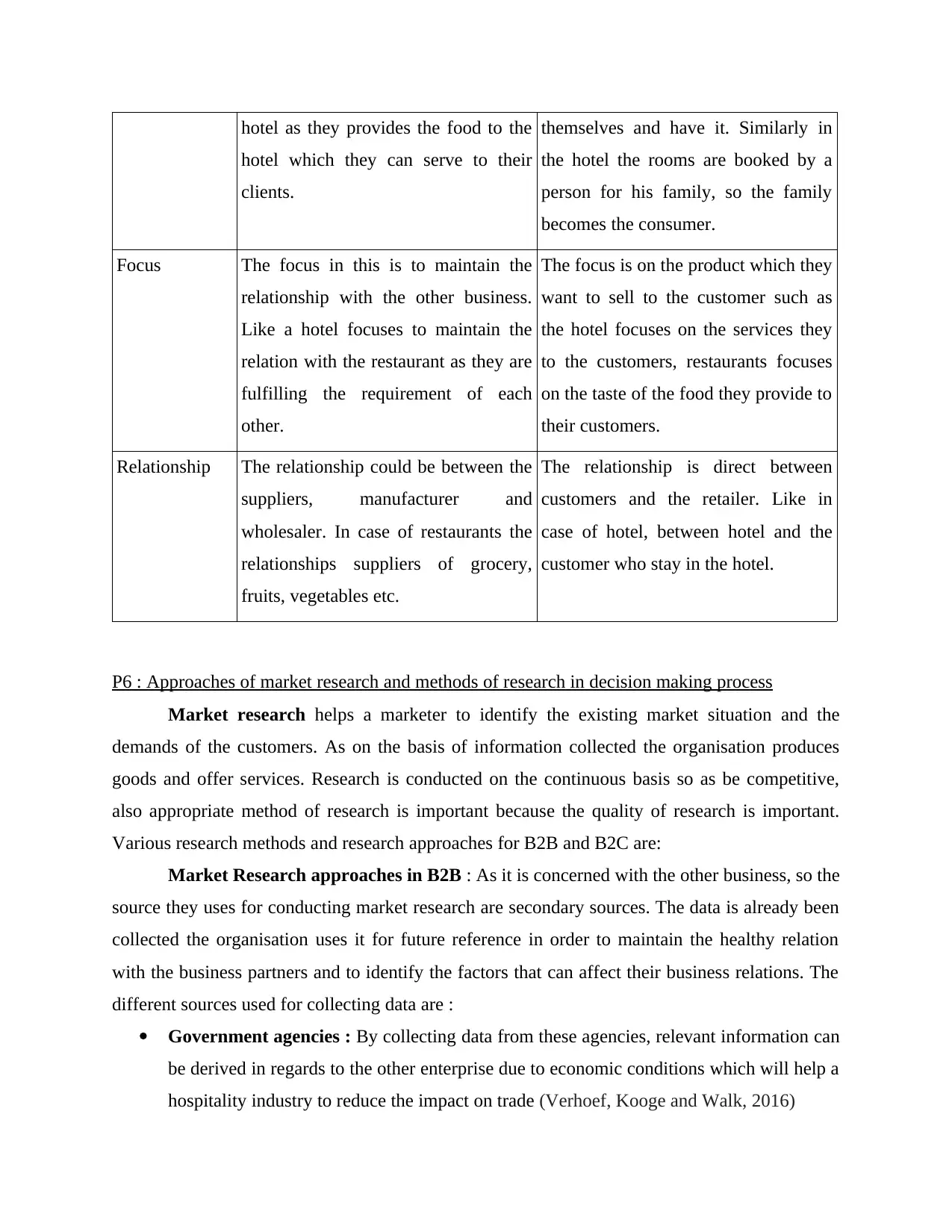
hotel as they provides the food to the
hotel which they can serve to their
clients.
themselves and have it. Similarly in
the hotel the rooms are booked by a
person for his family, so the family
becomes the consumer.
Focus The focus in this is to maintain the
relationship with the other business.
Like a hotel focuses to maintain the
relation with the restaurant as they are
fulfilling the requirement of each
other.
The focus is on the product which they
want to sell to the customer such as
the hotel focuses on the services they
to the customers, restaurants focuses
on the taste of the food they provide to
their customers.
Relationship The relationship could be between the
suppliers, manufacturer and
wholesaler. In case of restaurants the
relationships suppliers of grocery,
fruits, vegetables etc.
The relationship is direct between
customers and the retailer. Like in
case of hotel, between hotel and the
customer who stay in the hotel.
P6 : Approaches of market research and methods of research in decision making process
Market research helps a marketer to identify the existing market situation and the
demands of the customers. As on the basis of information collected the organisation produces
goods and offer services. Research is conducted on the continuous basis so as be competitive,
also appropriate method of research is important because the quality of research is important.
Various research methods and research approaches for B2B and B2C are:
Market Research approaches in B2B : As it is concerned with the other business, so the
source they uses for conducting market research are secondary sources. The data is already been
collected the organisation uses it for future reference in order to maintain the healthy relation
with the business partners and to identify the factors that can affect their business relations. The
different sources used for collecting data are :
Government agencies : By collecting data from these agencies, relevant information can
be derived in regards to the other enterprise due to economic conditions which will help a
hospitality industry to reduce the impact on trade (Verhoef, Kooge and Walk, 2016)
hotel which they can serve to their
clients.
themselves and have it. Similarly in
the hotel the rooms are booked by a
person for his family, so the family
becomes the consumer.
Focus The focus in this is to maintain the
relationship with the other business.
Like a hotel focuses to maintain the
relation with the restaurant as they are
fulfilling the requirement of each
other.
The focus is on the product which they
want to sell to the customer such as
the hotel focuses on the services they
to the customers, restaurants focuses
on the taste of the food they provide to
their customers.
Relationship The relationship could be between the
suppliers, manufacturer and
wholesaler. In case of restaurants the
relationships suppliers of grocery,
fruits, vegetables etc.
The relationship is direct between
customers and the retailer. Like in
case of hotel, between hotel and the
customer who stay in the hotel.
P6 : Approaches of market research and methods of research in decision making process
Market research helps a marketer to identify the existing market situation and the
demands of the customers. As on the basis of information collected the organisation produces
goods and offer services. Research is conducted on the continuous basis so as be competitive,
also appropriate method of research is important because the quality of research is important.
Various research methods and research approaches for B2B and B2C are:
Market Research approaches in B2B : As it is concerned with the other business, so the
source they uses for conducting market research are secondary sources. The data is already been
collected the organisation uses it for future reference in order to maintain the healthy relation
with the business partners and to identify the factors that can affect their business relations. The
different sources used for collecting data are :
Government agencies : By collecting data from these agencies, relevant information can
be derived in regards to the other enterprise due to economic conditions which will help a
hospitality industry to reduce the impact on trade (Verhoef, Kooge and Walk, 2016)
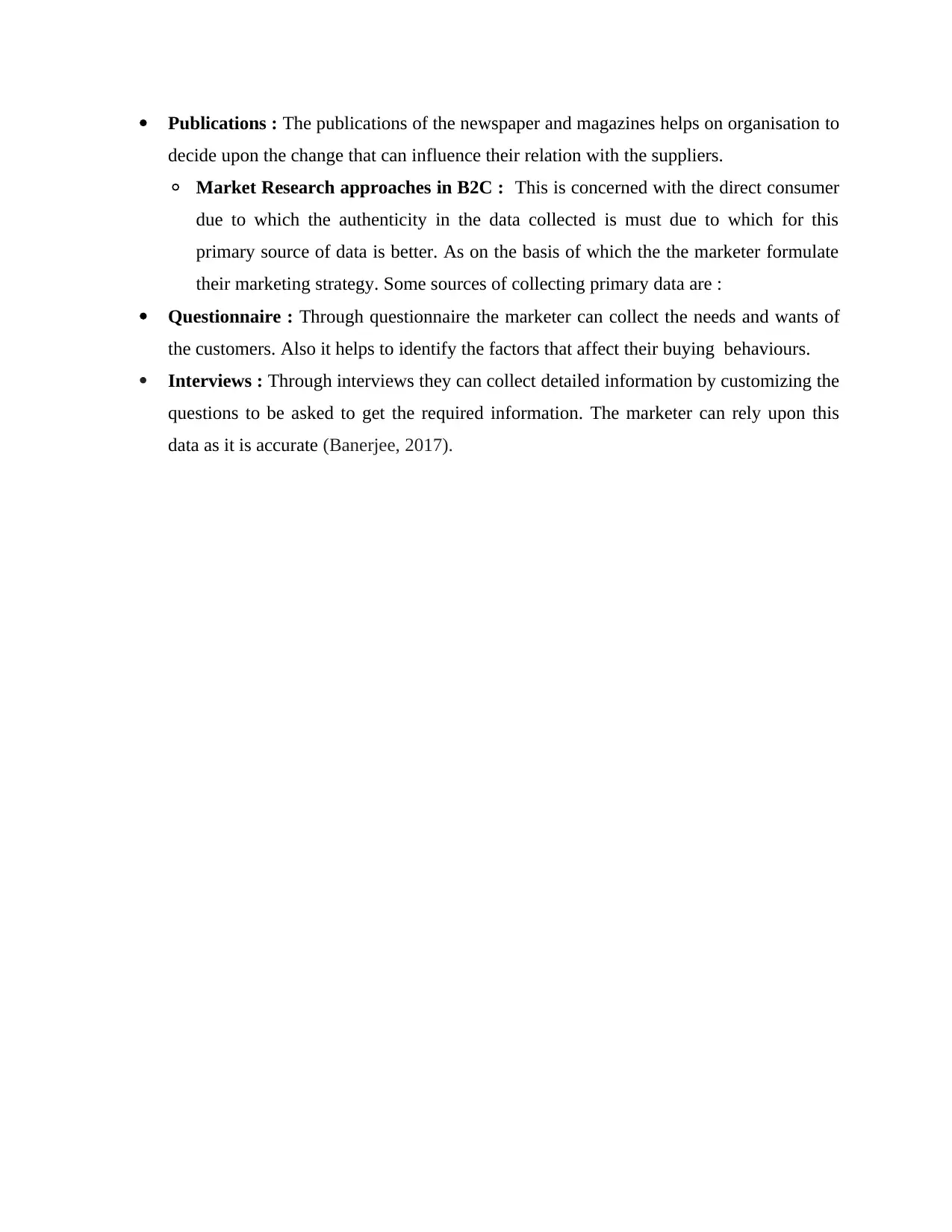
Publications : The publications of the newspaper and magazines helps on organisation to
decide upon the change that can influence their relation with the suppliers.
◦ Market Research approaches in B2C : This is concerned with the direct consumer
due to which the authenticity in the data collected is must due to which for this
primary source of data is better. As on the basis of which the the marketer formulate
their marketing strategy. Some sources of collecting primary data are :
Questionnaire : Through questionnaire the marketer can collect the needs and wants of
the customers. Also it helps to identify the factors that affect their buying behaviours.
Interviews : Through interviews they can collect detailed information by customizing the
questions to be asked to get the required information. The marketer can rely upon this
data as it is accurate (Banerjee, 2017).
decide upon the change that can influence their relation with the suppliers.
◦ Market Research approaches in B2C : This is concerned with the direct consumer
due to which the authenticity in the data collected is must due to which for this
primary source of data is better. As on the basis of which the the marketer formulate
their marketing strategy. Some sources of collecting primary data are :
Questionnaire : Through questionnaire the marketer can collect the needs and wants of
the customers. Also it helps to identify the factors that affect their buying behaviours.
Interviews : Through interviews they can collect detailed information by customizing the
questions to be asked to get the required information. The marketer can rely upon this
data as it is accurate (Banerjee, 2017).
⊘ This is a preview!⊘
Do you want full access?
Subscribe today to unlock all pages.

Trusted by 1+ million students worldwide
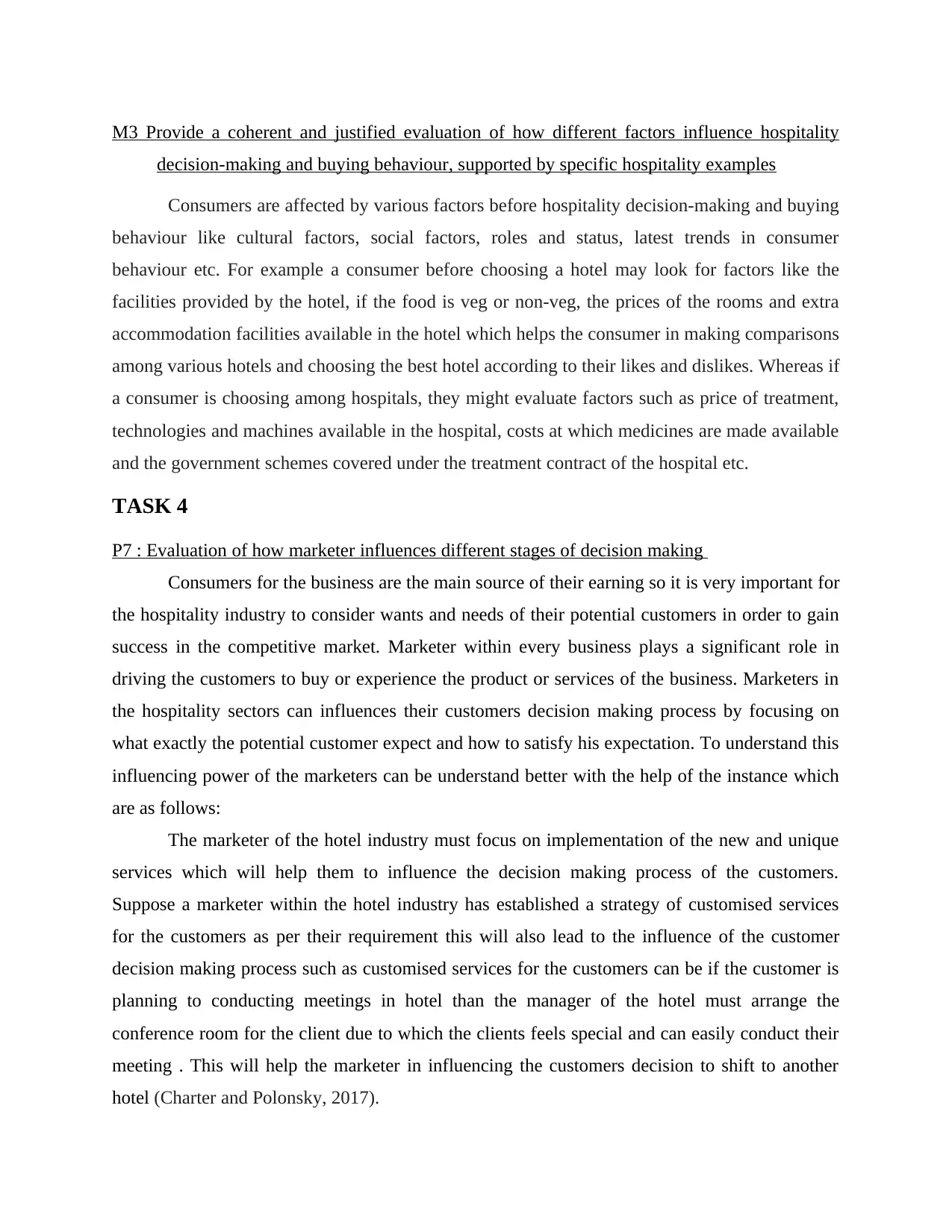
M3 Provide a coherent and justified evaluation of how different factors influence hospitality
decision-making and buying behaviour, supported by specific hospitality examples
Consumers are affected by various factors before hospitality decision-making and buying
behaviour like cultural factors, social factors, roles and status, latest trends in consumer
behaviour etc. For example a consumer before choosing a hotel may look for factors like the
facilities provided by the hotel, if the food is veg or non-veg, the prices of the rooms and extra
accommodation facilities available in the hotel which helps the consumer in making comparisons
among various hotels and choosing the best hotel according to their likes and dislikes. Whereas if
a consumer is choosing among hospitals, they might evaluate factors such as price of treatment,
technologies and machines available in the hospital, costs at which medicines are made available
and the government schemes covered under the treatment contract of the hospital etc.
TASK 4
P7 : Evaluation of how marketer influences different stages of decision making
Consumers for the business are the main source of their earning so it is very important for
the hospitality industry to consider wants and needs of their potential customers in order to gain
success in the competitive market. Marketer within every business plays a significant role in
driving the customers to buy or experience the product or services of the business. Marketers in
the hospitality sectors can influences their customers decision making process by focusing on
what exactly the potential customer expect and how to satisfy his expectation. To understand this
influencing power of the marketers can be understand better with the help of the instance which
are as follows:
The marketer of the hotel industry must focus on implementation of the new and unique
services which will help them to influence the decision making process of the customers.
Suppose a marketer within the hotel industry has established a strategy of customised services
for the customers as per their requirement this will also lead to the influence of the customer
decision making process such as customised services for the customers can be if the customer is
planning to conducting meetings in hotel than the manager of the hotel must arrange the
conference room for the client due to which the clients feels special and can easily conduct their
meeting . This will help the marketer in influencing the customers decision to shift to another
hotel (Charter and Polonsky, 2017).
decision-making and buying behaviour, supported by specific hospitality examples
Consumers are affected by various factors before hospitality decision-making and buying
behaviour like cultural factors, social factors, roles and status, latest trends in consumer
behaviour etc. For example a consumer before choosing a hotel may look for factors like the
facilities provided by the hotel, if the food is veg or non-veg, the prices of the rooms and extra
accommodation facilities available in the hotel which helps the consumer in making comparisons
among various hotels and choosing the best hotel according to their likes and dislikes. Whereas if
a consumer is choosing among hospitals, they might evaluate factors such as price of treatment,
technologies and machines available in the hospital, costs at which medicines are made available
and the government schemes covered under the treatment contract of the hospital etc.
TASK 4
P7 : Evaluation of how marketer influences different stages of decision making
Consumers for the business are the main source of their earning so it is very important for
the hospitality industry to consider wants and needs of their potential customers in order to gain
success in the competitive market. Marketer within every business plays a significant role in
driving the customers to buy or experience the product or services of the business. Marketers in
the hospitality sectors can influences their customers decision making process by focusing on
what exactly the potential customer expect and how to satisfy his expectation. To understand this
influencing power of the marketers can be understand better with the help of the instance which
are as follows:
The marketer of the hotel industry must focus on implementation of the new and unique
services which will help them to influence the decision making process of the customers.
Suppose a marketer within the hotel industry has established a strategy of customised services
for the customers as per their requirement this will also lead to the influence of the customer
decision making process such as customised services for the customers can be if the customer is
planning to conducting meetings in hotel than the manager of the hotel must arrange the
conference room for the client due to which the clients feels special and can easily conduct their
meeting . This will help the marketer in influencing the customers decision to shift to another
hotel (Charter and Polonsky, 2017).
Paraphrase This Document
Need a fresh take? Get an instant paraphrase of this document with our AI Paraphraser
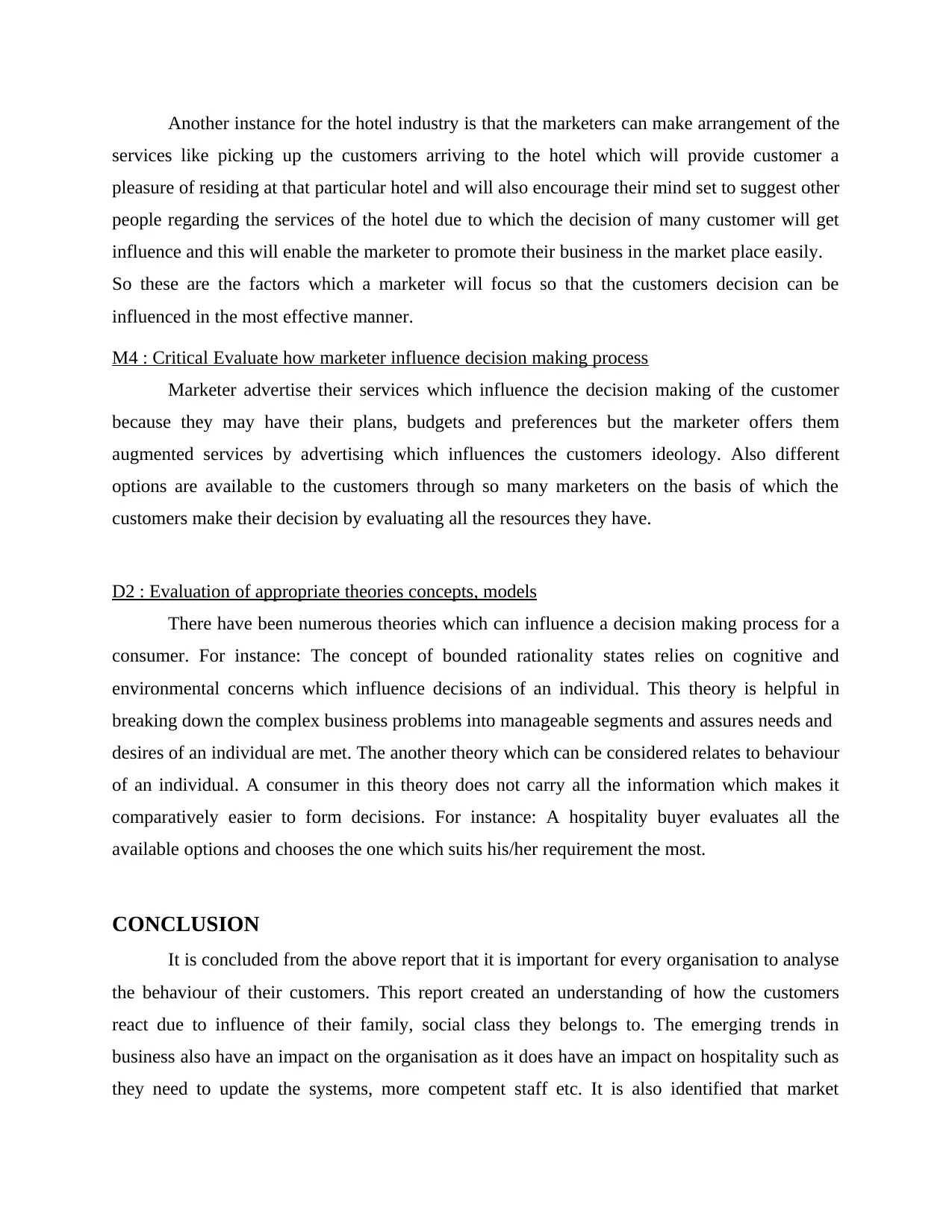
Another instance for the hotel industry is that the marketers can make arrangement of the
services like picking up the customers arriving to the hotel which will provide customer a
pleasure of residing at that particular hotel and will also encourage their mind set to suggest other
people regarding the services of the hotel due to which the decision of many customer will get
influence and this will enable the marketer to promote their business in the market place easily.
So these are the factors which a marketer will focus so that the customers decision can be
influenced in the most effective manner.
M4 : Critical Evaluate how marketer influence decision making process
Marketer advertise their services which influence the decision making of the customer
because they may have their plans, budgets and preferences but the marketer offers them
augmented services by advertising which influences the customers ideology. Also different
options are available to the customers through so many marketers on the basis of which the
customers make their decision by evaluating all the resources they have.
D2 : Evaluation of appropriate theories concepts, models
There have been numerous theories which can influence a decision making process for a
consumer. For instance: The concept of bounded rationality states relies on cognitive and
environmental concerns which influence decisions of an individual. This theory is helpful in
breaking down the complex business problems into manageable segments and assures needs and
desires of an individual are met. The another theory which can be considered relates to behaviour
of an individual. A consumer in this theory does not carry all the information which makes it
comparatively easier to form decisions. For instance: A hospitality buyer evaluates all the
available options and chooses the one which suits his/her requirement the most.
CONCLUSION
It is concluded from the above report that it is important for every organisation to analyse
the behaviour of their customers. This report created an understanding of how the customers
react due to influence of their family, social class they belongs to. The emerging trends in
business also have an impact on the organisation as it does have an impact on hospitality such as
they need to update the systems, more competent staff etc. It is also identified that market
services like picking up the customers arriving to the hotel which will provide customer a
pleasure of residing at that particular hotel and will also encourage their mind set to suggest other
people regarding the services of the hotel due to which the decision of many customer will get
influence and this will enable the marketer to promote their business in the market place easily.
So these are the factors which a marketer will focus so that the customers decision can be
influenced in the most effective manner.
M4 : Critical Evaluate how marketer influence decision making process
Marketer advertise their services which influence the decision making of the customer
because they may have their plans, budgets and preferences but the marketer offers them
augmented services by advertising which influences the customers ideology. Also different
options are available to the customers through so many marketers on the basis of which the
customers make their decision by evaluating all the resources they have.
D2 : Evaluation of appropriate theories concepts, models
There have been numerous theories which can influence a decision making process for a
consumer. For instance: The concept of bounded rationality states relies on cognitive and
environmental concerns which influence decisions of an individual. This theory is helpful in
breaking down the complex business problems into manageable segments and assures needs and
desires of an individual are met. The another theory which can be considered relates to behaviour
of an individual. A consumer in this theory does not carry all the information which makes it
comparatively easier to form decisions. For instance: A hospitality buyer evaluates all the
available options and chooses the one which suits his/her requirement the most.
CONCLUSION
It is concluded from the above report that it is important for every organisation to analyse
the behaviour of their customers. This report created an understanding of how the customers
react due to influence of their family, social class they belongs to. The emerging trends in
business also have an impact on the organisation as it does have an impact on hospitality such as
they need to update the systems, more competent staff etc. It is also identified that market
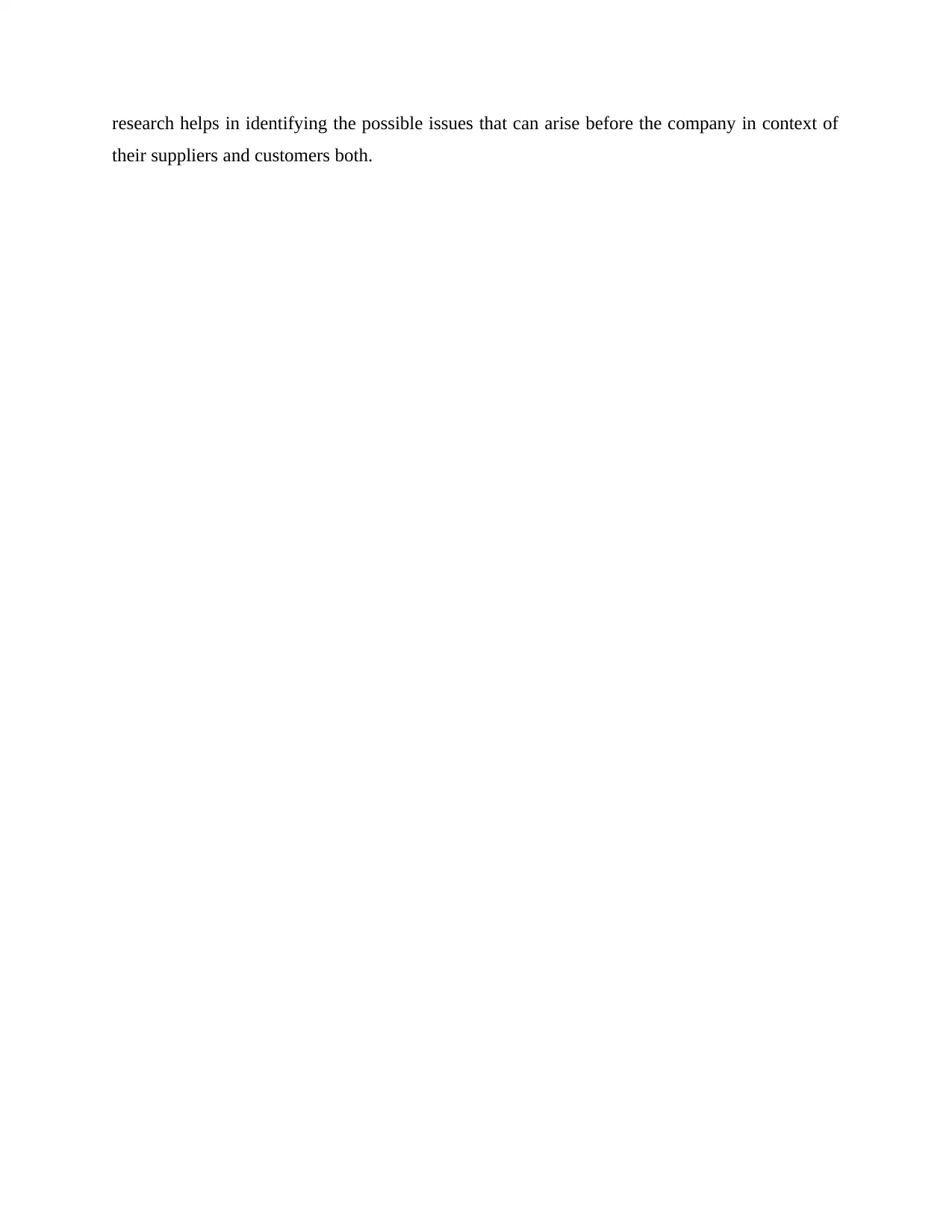
research helps in identifying the possible issues that can arise before the company in context of
their suppliers and customers both.
their suppliers and customers both.
⊘ This is a preview!⊘
Do you want full access?
Subscribe today to unlock all pages.

Trusted by 1+ million students worldwide
1 out of 14
Related Documents
Your All-in-One AI-Powered Toolkit for Academic Success.
+13062052269
info@desklib.com
Available 24*7 on WhatsApp / Email
![[object Object]](/_next/static/media/star-bottom.7253800d.svg)
Unlock your academic potential
Copyright © 2020–2026 A2Z Services. All Rights Reserved. Developed and managed by ZUCOL.





